(HIpE) 2009 Program and Abstracts - Health Sciences - Curtin ...
(HIpE) 2009 Program and Abstracts - Health Sciences - Curtin ...
(HIpE) 2009 Program and Abstracts - Health Sciences - Curtin ...
Create successful ePaper yourself
Turn your PDF publications into a flip-book with our unique Google optimized e-Paper software.
<strong>Abstracts</strong>Experiential interprofessional remote <strong>and</strong> Indigenous health education in the bush - CountryWeekHelen McHugh, Hamish Morgan, Corrina Pesich, Ivan Lin & Des ThompsonCombined Universities Centre for Rural <strong>Health</strong> - CUCRHNowhere is there a greater priority for health professionals to work together effectively as a team than in remotehealth service delivery. But underst<strong>and</strong>ing remote health is complex. Whilst epidemiological data clearlydemonstrates the poorer health status of those in remote regions, particularly for Aboriginal people,underst<strong>and</strong>ing the factors underpinning this scenario is hard to appreciate from a book. Furthermore thesestatistics fail to elaborate on the powerful connections people have to living in remote areas as well as thepotential benefits these places can have on health <strong>and</strong> well being, <strong>and</strong> this relationship may be used to facilitatedelivering health care in this context.Since 2002 the Combined Universities Centre for Rural <strong>Health</strong> has offered a program called Country Week toaddress this. Country Week is an annual one week intensive interprofessional program that focuses on remote<strong>and</strong> Indigenous health, <strong>and</strong> is offered in a remote or rural place. It is offered to all Australian resident studentsstudying health courses in the five major Western Australian universities. Country Week is underpinned by anumber of guiding principles. It is firmly based on experiential interprofessional education. It is offered as muchas is possible as a partnership with people <strong>and</strong> organizations in remote regions where we carefully considernotions of reciprocity between students <strong>and</strong> community. The process of reflection is key to facilitating learning.This presentation will focus on the immediate impact of Country Week on students, discuss brieflyconsiderations in delivering this program, <strong>and</strong> more broadly, our views on the place of such programs inaddressing remote <strong>and</strong> Indigenous health.Interprofessional experience opportunities in <strong>Curtin</strong>’s Activity, Food <strong>and</strong> Attitudes <strong>Program</strong>:A multidisciplinary program for overweight <strong>and</strong> obese adolescents.Melissa Davis, Mahi Weiss, Leon Straker & Margo Brewer<strong>Curtin</strong> University of TechnologyApproximately 25% of all Australian young people are overweight or obese. This historically unprecedented rateis believed to be contributed to by changes to environmental <strong>and</strong> societal factors such as a decrease in physicalactivity, an increase in sedentary behavior <strong>and</strong> the availability of high fat, high energy food. Overweight <strong>and</strong>obese adolescents are likely to become obese adults, <strong>and</strong> are at an increased risk for a range of short-term <strong>and</strong>long-term psychosocial <strong>and</strong> medical problems. Therefore, treating obesity in adolescence is an important priorityfor health-care providers. Given the multiple factors contributing to adolescent obesity, best practice guidelinesspecify that treatments offered in a family context <strong>and</strong> incorporating strategies from multiple domains are mostlikely to be efficacious. This presents a challenge for health professionals to effectively work together to presentan intervention.Staff <strong>and</strong> students from physiotherapy, dietetics, psychology, social work, health promotion <strong>and</strong> medicalprofessionals have developed a program for overweight <strong>and</strong> obese adolescents <strong>and</strong> their parents, based on aprogram developed at Princess Margaret Hospital for Children. Participants attend two-hour sessions, twice aweek for 8 weeks, involving exercise sessions for adolescents, <strong>and</strong> education sessions for adolescents <strong>and</strong> parents.The program aims to create changes in family habits which will lead to long term <strong>and</strong> sustainable changes.Developing <strong>and</strong> implementing the multidisciplinary intervention has provided staff <strong>and</strong> students excellentopportunities to learn about other health professions <strong>and</strong> how multidisciplinary collaboration can maximizepositive outcomes for clients.<strong>Health</strong> Interprofessional Education (<strong>HIpE</strong> <strong>2009</strong>) — Student Conference 8



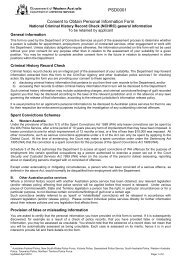
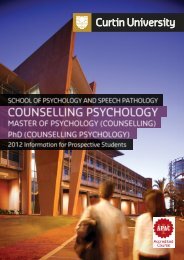
![Mental health commission report July 2010 - June 2011 [.pdf]](https://img.yumpu.com/50755705/1/184x260/mental-health-commission-report-july-2010-june-2011-pdf.jpg?quality=85)
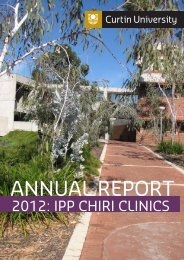
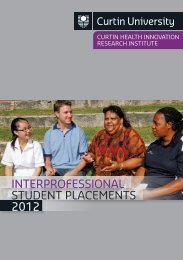
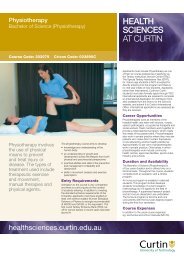
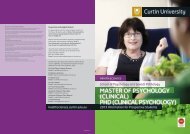
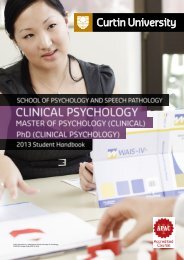

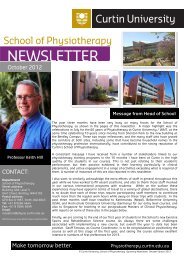
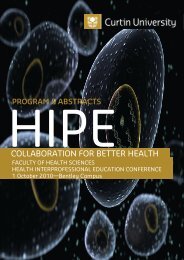
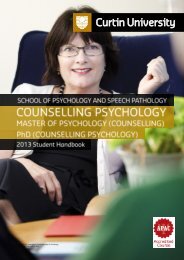
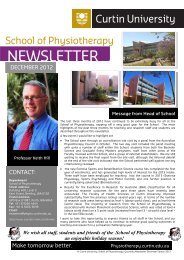
![2007 Annual Report [.pdf] - Health Sciences - Curtin University](https://img.yumpu.com/44476724/1/184x260/2007-annual-report-pdf-health-sciences-curtin-university.jpg?quality=85)